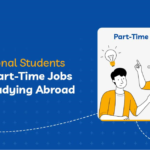Considering the fact that studying abroad is only an experience of earning international exposure, balancing pocket money against settling into a new environment is pretty challenging. One such effective solution is to find part-time work. Not only does this keep you afloat with living expenses, but it also enriches the global experience. Wondering how to find part-time work while studying abroad? This comprehensive guide will arm you with the kind of knowledge and tools to help you successfully balance work and study.
1. Be sure about the work rights and regulations
It is essential to learn about the work regulations for international students in your host country prior to embarking on the job search:
Check Visa Restrictions: Different nations have rules, which are specific to the number of hours international students are allowed to work. Students are allowed to study at universities in the UK and work up to 20 hours per week during term time.
Know the Domestic Labour Laws Learn the minimum wage, tax requirements, and employment rights in the country where you will study. Knowing all these regulations ensures that you are protected and compliant
2. Use University Resources and Job Boards
Your university is always willing to help you find some part-time work:
Go to the Career Services Office: Most universities have provisions for career counseling and job placements, especially for students. They would give leads to jobs, besides tips on writing resumes and preparing for interviews.
Check University Job Boards: Many of these universities advertise local business and campus department job openings strictly for the students.
Keywords: university career services, student job boards, university job placements, campus employment
3. Local Job Search
Other than University Resources, some other sources are:
Local Businesses: Very often, local businesses do not advertise their open positions on the Internet. It never hurts to go into any shop, café, or restaurant and just ask about job availability.
Online Job Search:
Websites like Indeed, Glassdoor, and other local job boards consistently update part-time jobs. You can filter your search to look for student-friendly positions.
Keywords: local job opportunities, job search websites, part-time jobs for students, local business job openings
4. Network and Use Social Media
This can provide you with an advantage in knowing of job openings that may not be otherwise advertised:
Join Student and Professional Organizations: You can become involved in student clubs, professional societies, and social groups of a nature relevant to your field of interest. This type of networking can provide job referrals and inside information for you.
Use Social Media: Save your time by posting on LinkedIn, Facebook, and even Instagram; it can help you find job leads. Join local groups, like pages, and post or comment in the community to find opportunities.
Keywords: networking for jobs student professional groups social media job search linkedin job opportunities
5. Prepare Your Application Materials
A prepared application will go a long way:
Build up an effective resume and cover letter: Personalize your resume and cover letter to demonstrate the reasons why you are the best person for the job, or better stated, why you would be a good fit. Draw special attention to any former experience working and skills related to this field.
Prepare for Interviews: Do some research concerning possible questions asked during interviews and practice your answers. Be ready to express how you intend to balance your time so as not to fall behind in studies and maintain a good academic standing.
Keywords: resume for international students, cover letter tips, job interview preparation, student job application materials
6. Balancing Work and Study Effectively
Finding a job is not the end; being able to work and study is what really matters:
Plan It Out: Get a planner or use a digital calendar to keep up with studying, working, and other personal matters. Allow time for study, work, and personal life so as not to live an imbalanced life.
Discuss with the Employer: Notify the employer about your academic schedule. Work-hour flexibility can help a student handle both easily, without compromising on his/her studies.
Keywords: Balancing work and study, Time management for students, Flexible work hours, Student work-life balance
Conclusion
If you can find part-time jobs during your study abroad, it can add great enrichment to the experience abroad, defray a portion of living expenses, and add meaningful skills and connections to the resume. You can balance work and study while studying abroad by using knowledge of work regulations, university resources, local opportunity searches, wise networking, and time management.
Want more tips on how to deal with student life and studying abroad? Subscribe to our blog to keep up to date with our latest posts!









